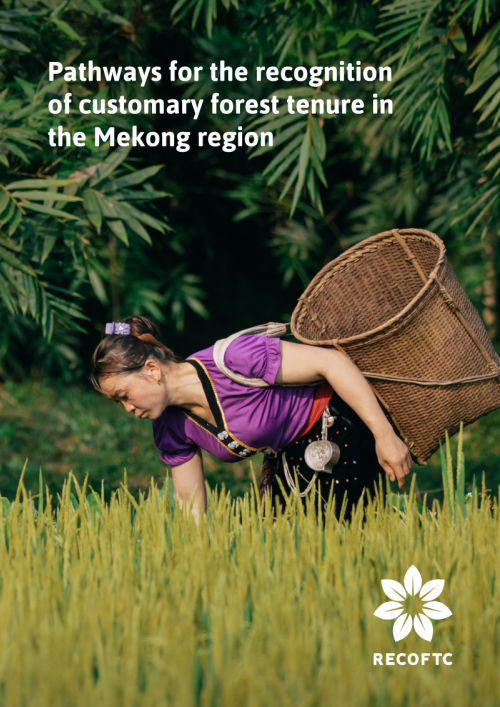APA 6th ed. Pathways for the recognition of customary forest tenure in the Mekong region. (2022, November 22). Retrieved from https://www.recoftc.org/publications/0000429
MLA 8th ed. Pathways for the recognition of customary forest tenure in the Mekong region. RECOFTC, 22 November 2022, https://www.recoftc.org/publications/0000429.
Chicago 17th ed. RECOFTC. 2022. "Pathways for the recognition of customary forest tenure in the Mekong region." Published November 22, 2022. https://www.recoftc.org/publications/0000429.
Pathways for the recognition of customary forest tenure in the Mekong region

Globally, about 2 billion people live under a customary tenure system, which is a set of rules and norms that govern local peoples’ use of forests, land and other natural resources. This tenure and its accompanying rights are crucial to peoples’ livelihoods, food security and culture, as well as to forest protection, biodiversity conservation and climate change mitigation.
Customary tenure has long been insecure and, in many places, it is under growing pressure. But it is also increasingly recognized through a variety of mechanisms, both formal and informal. This report focuses on the recognition of customary tenure of communities living in forested landscapes in Cambodia, Lao People’s Democratic Republic, Myanmar and Viet Nam and includes a case study from Thailand. The research is a product of the Regional Customary Tenure Alliance, a partnership funded by the Mekong Region Land Governance (MRLG) Project.
The Regional Customary Tenure Alliance is a partnership funded by the Mekong Region Land Governance (MRLG) Project. The Regional Customary Tenure Alliance is implemented by RECOFTC, the Non-Timber Forest Products Exchange Programme (NTFP-EP), the Asian Farmers’ Association for Sustainable Rural Development (AFA) and the Asia Indigenous Peoples Pact (AIPP), in collaboration with partners in Cambodia, Lao People’s Democratic Republic, Myanmar and Viet Nam.
The Alliance also works with national and regional platforms that focus on forests, land and other natural resources. Through these collaborations, the Alliance promotes safeguard mechanisms for the recognition and protection of customary tenure rights of forest-dependent communities, farmers, Indigenous Peoples, ethnic minorities and women in the Mekong region.

